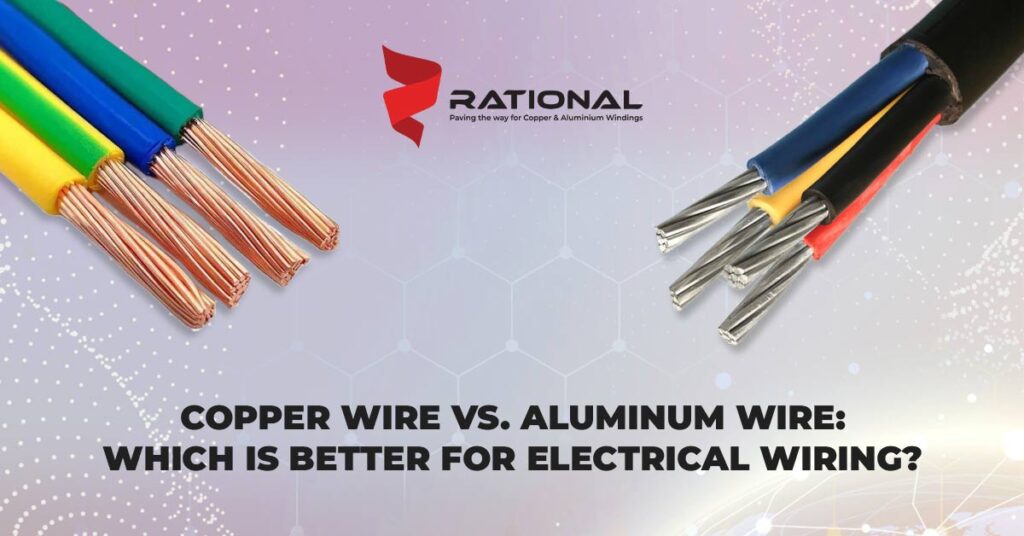Have you ever looked inside your walls and wondered about those wires running everywhere? It’s likely that you have either copper vs aluminium wiring in your home or business. These two metals are the most common conductors used in electrical wiring, but they each have distinct properties. So, which one is better? In this blog, let’s look in and find out!
Understanding Copper vs Aluminium Wiring
Copper Wiring: Copper has been the industry standard for electrical wiring for decades. It’s known for its exceptional conductivity, which means it can carry electrical current with less energy loss than aluminium. Copper is also highly ductile (can bend without breaking) and resistant to corrosion.
Aluminium Wiring: Aluminium is a lighter and more affordable alternative to copper. While its conductivity isn’t quite as good, aluminium wiring can be a viable option under the right circumstances. However, it does have some drawbacks. Aluminium is more prone to oxidation and has a higher thermal expansion rate (meaning it expands and contracts more with temperature changes).
Copper vs Aluminium Wiring: Which Wire Wins?
Here’s a breakdown of copper vs aluminium wiring by some of the essential characteristics to consider:
- Conductivity:
Copper is king. It has a much higher conductivity than aluminium, meaning electricity flows more easily through copper wires. This translates to less energy wasted as heat, potentially lowering your utility bills slightly.
- Durability:
Copper takes this round too. Copper is more resistant to wear and tear, plus less prone to corrosion compared to aluminium. This makes copper wiring a safer, longer-lasting option.
- Flexibility:
Aluminium scores a point here. Its increased flexibility compared to copper makes it a bit easier to manoeuvre during installation, especially in tight spaces.
- Cost:
The biggest advantage of aluminium shows up here. Aluminium wiring is significantly cheaper than copper. That’s why it’s sometimes used in larger-scale installations (think power lines) where cost savings outweigh other considerations.
- Safety:
This is where things get serious. In the past, aluminium wiring had a bad reputation due to its tendency to overheat at connection points. This could lead to potential fire hazards. Modern aluminium wiring, if installed correctly and with special anti-oxidant compounds, mitigates such risks. However, copper remains the inherently safer choice.
So, Which Should You Choose?
For most residential and standard commercial buildings, copper reigns supreme. The benefits outweigh the extra cost. Here are the main reasons:
- Superior Conductivity = Energy Efficient: You’ll enjoy slightly better energy efficiency with copper wiring.
- Durability = Peace of Mind: Copper wiring is more reliable and will last longer.
- Safety = Top Priority: Copper wiring offers greater safety margins and less long-term maintenance worry.
When Aluminium Might Work
Cost is the biggest factor. In the following limited scenarios, aluminium may be a viable choice:
- Large Construction Projects: If you’re constructing a huge building or wiring long stretches of power lines, the cost savings of aluminium vs copper wire start to add up significantly.
- Temporary Installations: For a temporary structure or event, aluminium’s lower cost and easier installation might make sense. Here’s a breakdown of copper vs aluminium wiring by some of the essential characteristics to consider:
A Note on Installation
Regardless of whether you choose copper vs aluminium wiring, hiring a qualified electrician is non-negotiable. Electrical work is complex and improper installation can have disastrous consequences. This is particularly essential with aluminium wiring, which requires a higher level of skill and care to be installed safely. So, let’s take a look at India’s largest copper wire manufacturers and suppliers, Rational Engineers.
Rational Engineers: Largest copper wire manufacturer
Rational Engineers has been providing high-quality copper wire since its establishment in 1989. With inbuilt proven quality norms, cognizant dedicated management and workforce, and persistent pursuit of business excellence, they are committed to delivering top-notch products that meet international standards. When comparing aluminium vs copper wire or aluminium vs copper cable, Rational Engineers stands out as a trusted supplier of copper wire.
Partnering for Progress: Rational & Gemini Instratech
Boasting a rich legacy, shared values, and a forward-thinking approach, Rational(largest copper wire manufacturer)is much more than just a copper supplier. Their story is intrinsically linked with that of another prominent player in the sector, Gemini(Instrument Transformers Manufacturers)
These two heavyweights in the metalworking field join forces, rooted in a mutual devotion to exceptional metal quality. Together, Rational Engineers and Gemini Instratech harness their collective knowledge and passion to bring clarity to the complex web of electrical systems serving numerous households and enterprises worldwide. Such synergy fosters innovation while propelling advancements throughout the industry and exploring untapped opportunities.
Conclusion
When it comes to copper vs aluminium wiring, copper is the clear winner for most home and building projects. It more than makes up for the higher upfront cost with its superior performance, durability, and safety. However, there are specific situations where aluminium vs copper cable might be a feasible alternative, particularly on a large scale.

